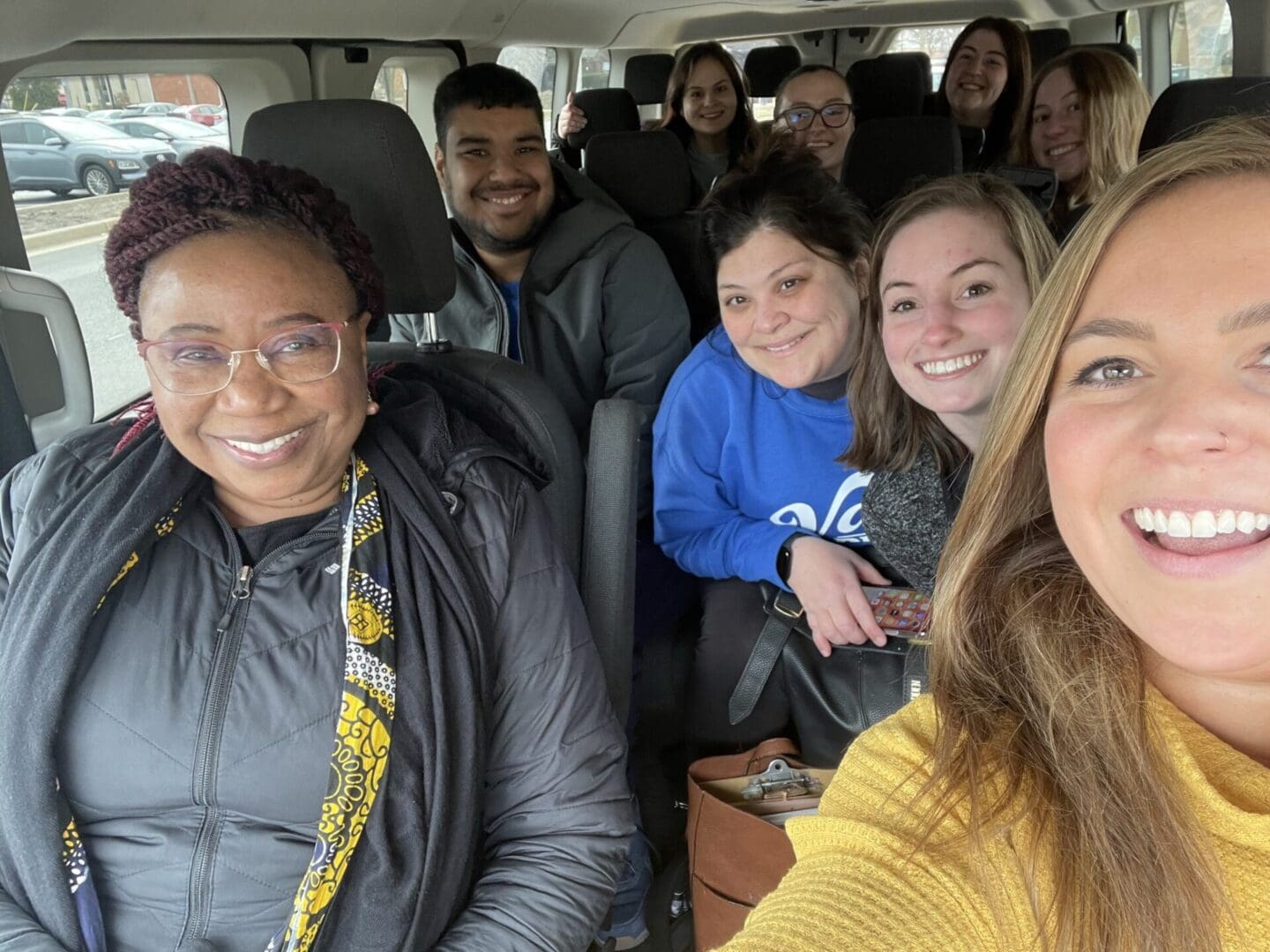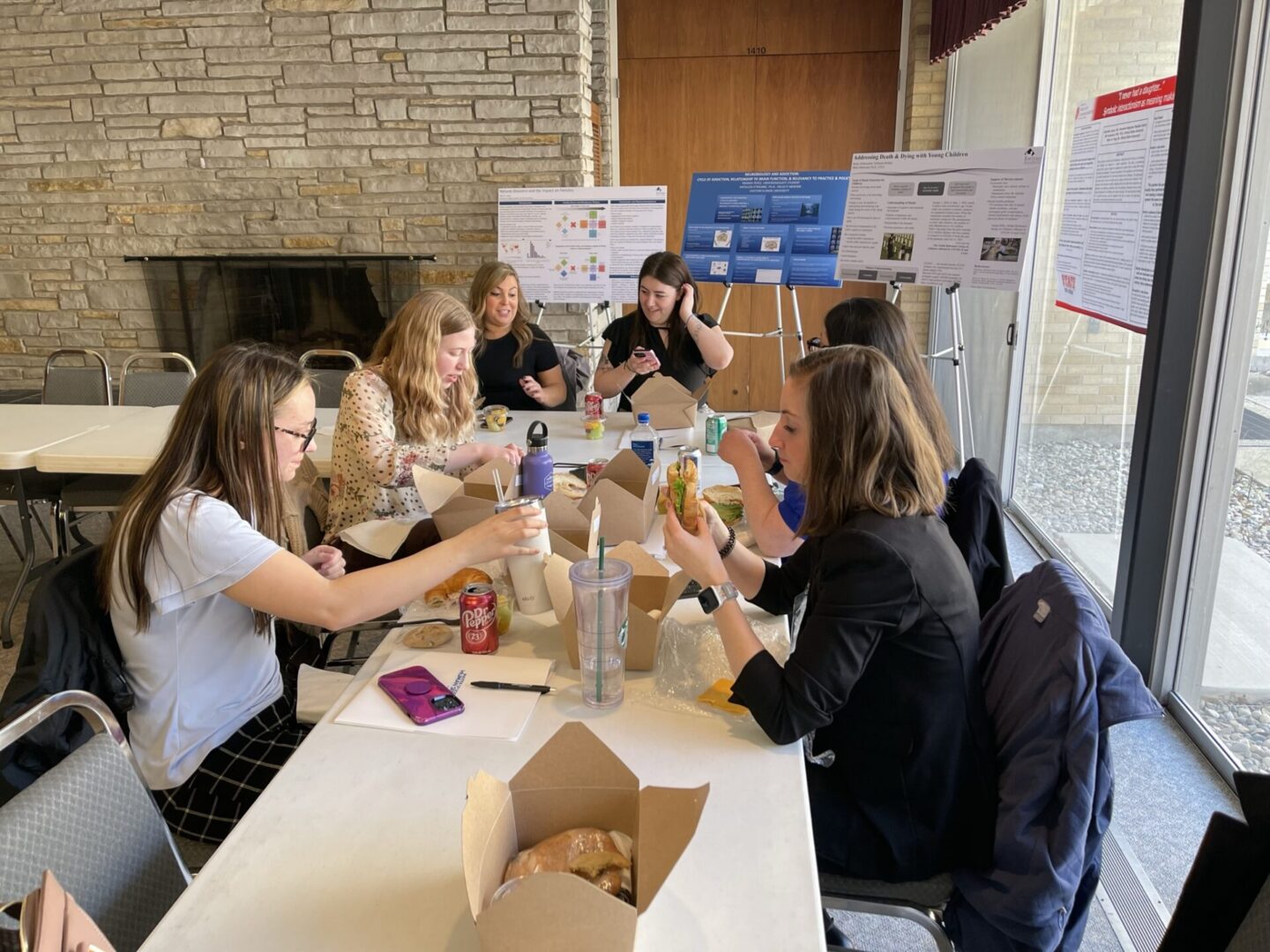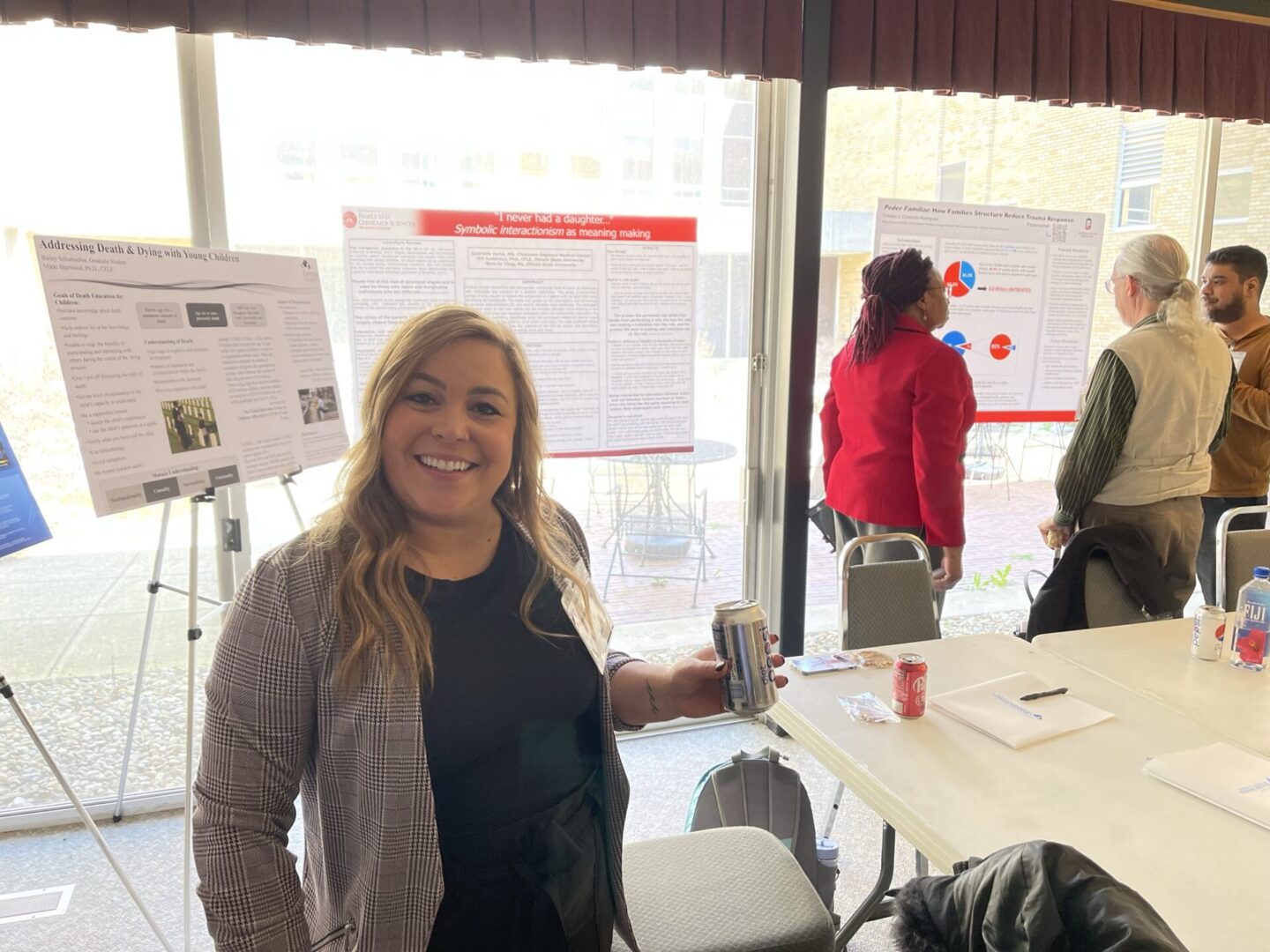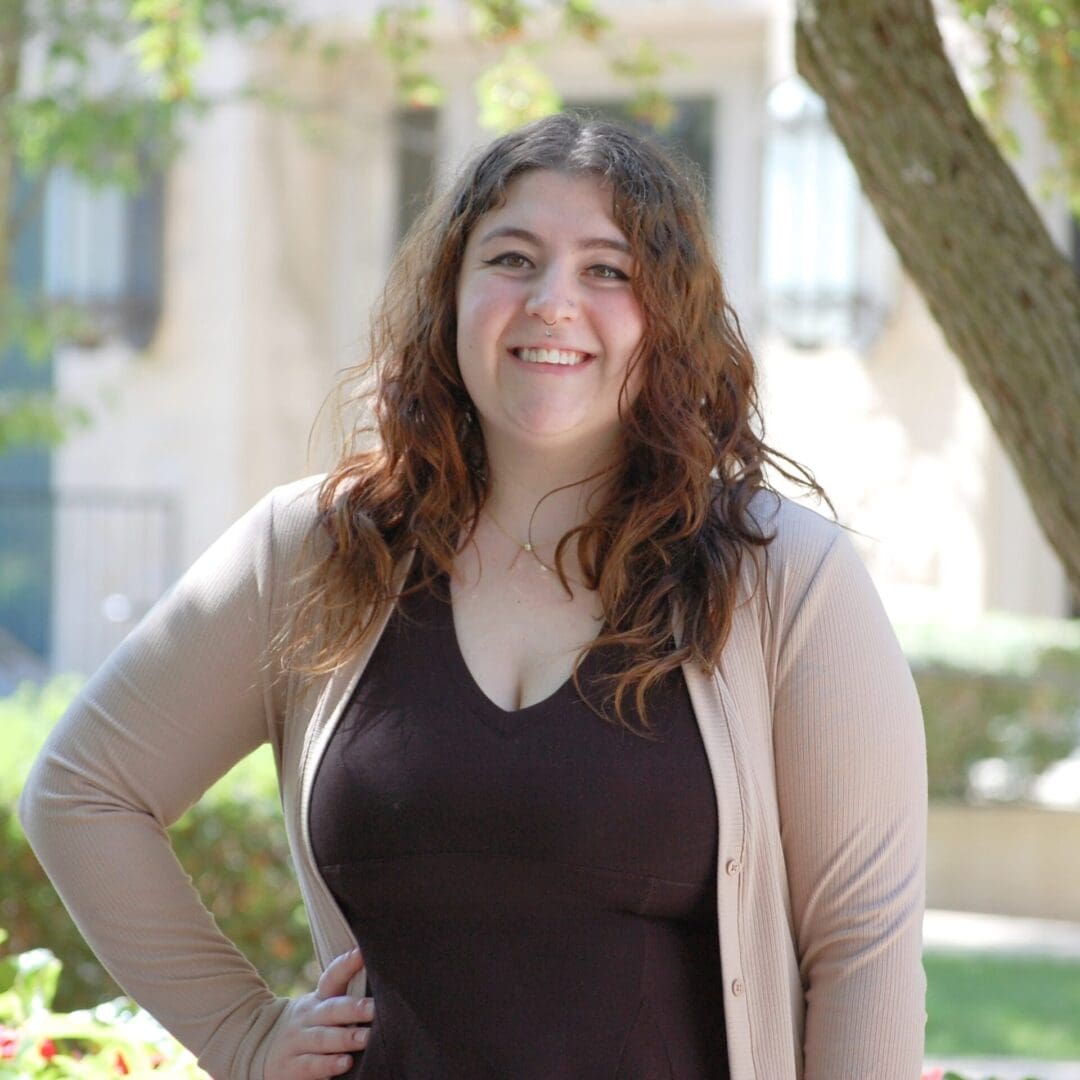On March 31st, our research team attended the Illinois Council on Family Relations (ILCFR) 2023 Annual Conference in Charleston, Illinois, at Eastern Illinois University. The whole team (minus Dr. Sibley) had piled into a van and endured the 3-hour drive to Charleston the day before. The drive was filled with conversation and music, as well as a lot of laughs. We all arrived quite hungry and enjoyed dinner at Cracker Barrel before we headed to the hotel. We settled in and took over the breakfast room that night to all practice one more time before the big day. The man at the front desk must have been confused yet intrigued at the same time. We all got some much needed rest afterward and woke up very eager and ready to present.
The team arrived bright and early, and Dr. Sibley followed shortly after. We ate breakfast and got some coffee into our systems before the event began. Shortly after, we had the pleasure of attending the keynote presentation with Karen Cook from Hour House. Immediately after, we began to make our way to the classroom to begin breakout session 1 and present the data Dr. Sibley and the team had worked so hard on. This year’s conference offered two breakout sessions and a poster presentation during lunch. Each session contained a number of interesting research topics that we would have loved to attend. Our team had planned to present in both breakout sessions, which sadly left no time.
The day started beautifully, and the team was excited and eager to share our work. Dr. Sibley and 4 of our members (Breanna Terry, Jessica Lopez, Katherine Smail, and Stephanie Lipira) presented “Constructing Just Talking as a Recent Trend in Emerging Adult Romantic Relationships”, based on research we have completed about the concept of just talking in the context of emerging adulthood and highlights technology’s role in this trend as well as the concept of sliding versus deciding. This research is based on data collected by Dr. Sibley.
Our presentation first began with Stephanie speaking on commitment and stated that according to Stanley and Rhoades (2009):
“At the root, commitment means making a decision to choose one alternative over others, and that in choosing, one is deciding to give up the other alternatives. Deciding is fundamental to commitment.”
Stephanie followed by talking about asymmetrical commitment. Katherine then took the stage and began talking about the changing trends in relationships among emerging adults, highlighting ambiguity and avoidance regarding the DTR talk. These concepts were important to understand in laying the groundwork for the current research.
- RQ1: How do emerging adults conceptualize just talking?
- RQ2: What are emerging adults’ reasons for just talking?
- RQ3: How does emerging adult technology use facilitate the just talking process?
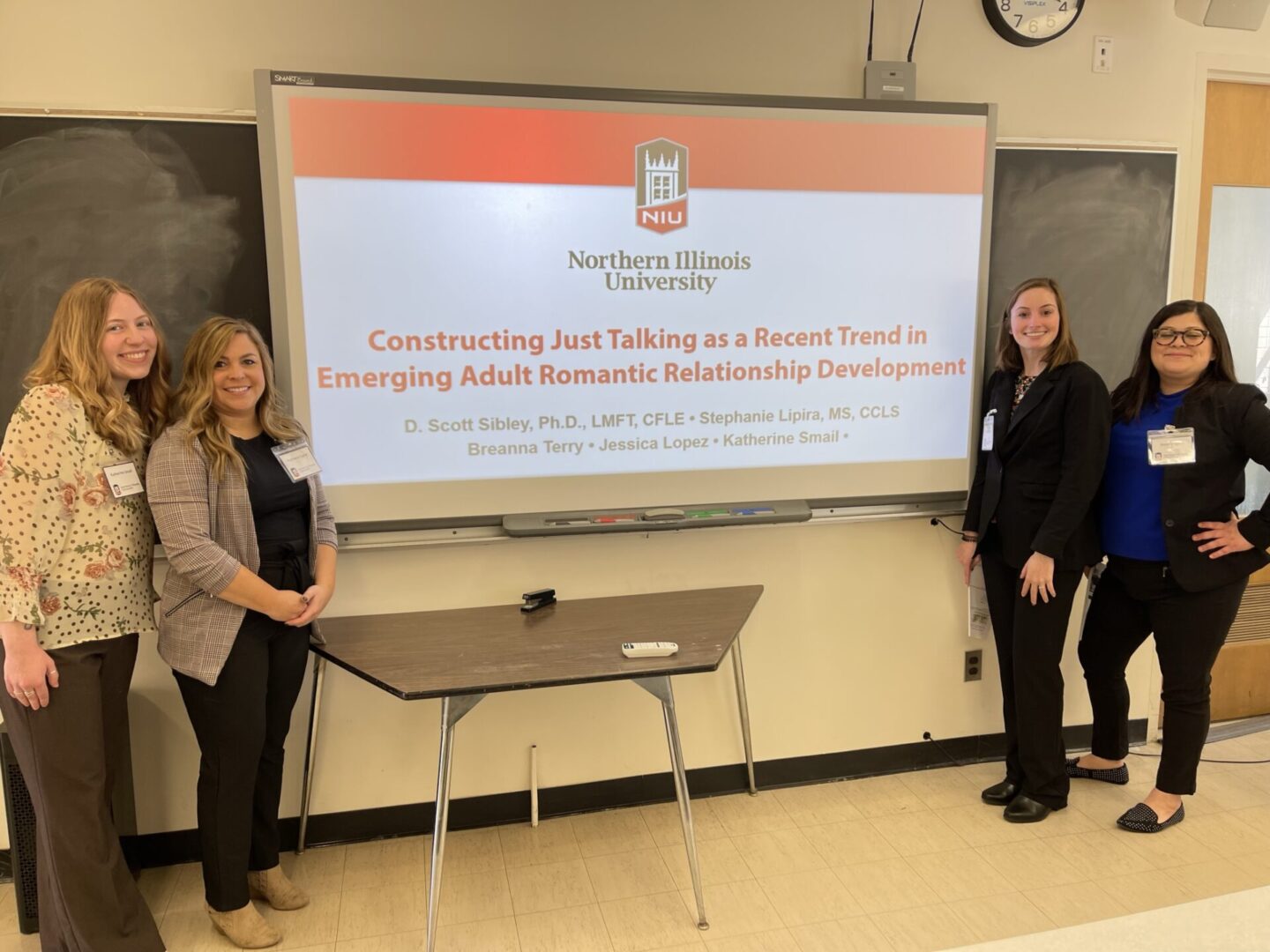 Dr. Sibley then began speaking on the methods section and his own personal experience in first hearing about the concept of just talking. He did a great job at explaining the concept of just talking and how the focus groups were arranged and analyzed. Breanna, Jessica, and Stephanie then began speaking on the results of the research.
Dr. Sibley then began speaking on the methods section and his own personal experience in first hearing about the concept of just talking. He did a great job at explaining the concept of just talking and how the focus groups were arranged and analyzed. Breanna, Jessica, and Stephanie then began speaking on the results of the research.
Regarding the first research question, 3 themes were present,
- Pre-dating
- Screening process
- Avoidance of commitment
Four themes emerged in the second question regarding the reasons for just talking:
- Fear of rejection
- Less pressure
- Relationship potential
- Keeping options open
Lastly, four themes emerged in the last question regarding technology’s role:
- Less effort required
- Constant communication
- Image crafting
- Increases pool of potential partners
This research expanded our knowledge on the habits of emerging adults as well as how and why the concept of just talking has become such a big part of the dating process. This topic has been explored and discussed for years on the research team. We will be presenting more about just talking at the upcoming Society for the Study of Emerging Adulthood 2023 Conference in San Diego, California. Additionally, technology was proven to be a huge factor in facilitating this trend as well. Lastly, it was mentioned that more research needs to be done regarding this topic, and even a combination of qualitative and quantitative methods might give more thorough results.
The group had finished their first presentation and felt good about their work, but then we began hearing news of a severe thunderstorm approaching. Nonetheless, we carried on and headed down to lunch, where we got to look at a number of poster presentations and speak with others about their research. It was then that we, as a team decided that it was best for us to leave in order to beat the big storm heading our way. We were sad to cut our time there short, but with the 3-hour drive ahead of us, we couldn’t risk getting caught in what was said to be a severe thunderstorm. The drive home ended up being slightly stressful yet still filled with laughter and conversation. Luckily, we arrived back at Northern Illinois University right as it began to rain. Later that evening, we were very thankful that we chose to leave early because by 8:00pm, tornado sirens were going off, and many of us had to take shelter.
Overall, the conference went well, given the circumstances. This was a great learning experience for the team, both new and old members. I personally loved getting to cheer my fellow researchers on while they presented and being immersed in the world of research. This was also a great bonding experience for the team, as we got to spend a lot of time outside the conference together. I, along with the rest of the team, are very excited about next year’s conference, and we hope the weather cooperates so we can spend more time sharing our research as well as learning about other presenters.
References
- Stanley, S. M., Rhoades, G. K. and Whitton, S. W. (2010). Commitment: Functions, Formation, and the Securing of Romantic Attachment. Journal of Family Theory & Review, 2 243-257.
- Stanley, S. & Rhoades, G. (2009). Marriages at risk: Relationship formation and opportunities for relationship education. In H. Benson and S. Callan (Eds.), What works in relationship education: Lessons from academics and service deliverers in the United States and Europe (pp. 21 – 44). Doha, Qatar: Doha International Institute for Family Studies and Development.
Hello! My name is Isabella Boccia but you can call me Bella! I am a undergrad student at NIU going into my senior year. I started on the research team in the spring of 2023 and plan on continuing as long as possible. I hope to go to grad school in the marriage and family therapy program and eventually become a licensed marriage and family therapist! I have grown to have a huge passion for helping others, especially in the context of relationships.
